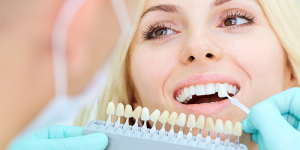 One of the advantages of getting dental implants is that they allow you to replace any missing or extracted teeth, without requiring you to make significant changes to your lifestyle. Patients who have dental implants are generally able to enjoy their favorite foods without discomfort or pain.
One of the advantages of getting dental implants is that they allow you to replace any missing or extracted teeth, without requiring you to make significant changes to your lifestyle. Patients who have dental implants are generally able to enjoy their favorite foods without discomfort or pain.
Before you reach the point of normal diet, there will be a recovery period, during which you will want to pay special attention to your eating habits. Start off with easier-to-chew foods as your implants heal, then gradually shift toward a more normal diet.
Recovering from Dental Implants
Immediately following your dental implant surgery, you can anticipate a few common side effects, including tenderness, swelling, pain, and some bleeding. These are all normal symptoms of oral surgery.
Most patients find that the worst of these symptoms subside within two or three days. After a week to 10 days, most patients feel more or less back to normal.
It is during this initial recovery window that patients are advised to be cautious about what they eat, and be patient as they build tolerance for eating their usual foods.









